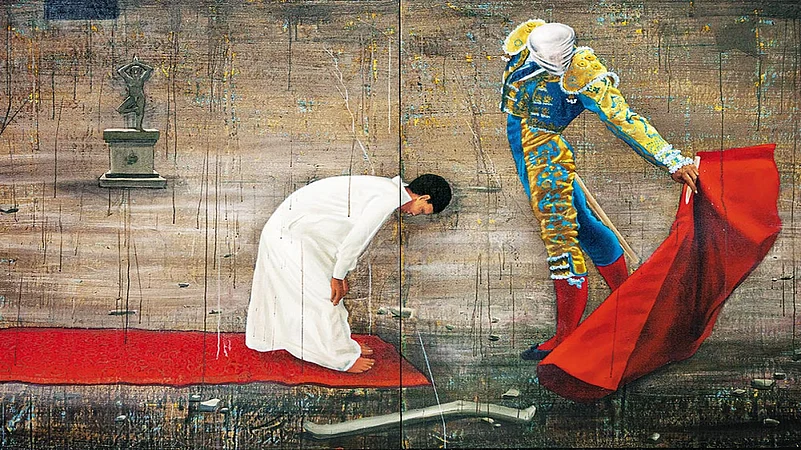The withdrawal of the farm laws has given a new life to the idea of protest in India. Only a day before the government looked invincible and the people powerless, destined to accept its laws and diktats legitimised by its brute majority in Parliament. Privately it was being said that the protest was floundering and the farm leadership should have thought about strategically withdrawing the agitation after the suspension of the laws by the government.
We have heard this lament several times in the last seven years of this government: protests do not work. The farmers’ protests were preceded by the anti CAA/NRC agitation which had to be withdrawn—or suspended—because of the pandemic. The protesters then too faced violence and persecution from the state or state-backed non-state actors. But the fact that the government has not yet framed rules for the CAA and put the NRC on hold, even after claiming both were urgent, shows that the protests against the divisive citizenship law did have an impact.
It is true that there are instances when protests do not seem to work, or they are suppressed or fade away or go awry. As has happened in Sudan where the military has reinstated the prime minister after long protests. Or the suppressed protests of Hong Kong. Or the inconclusive protests in Thailand or Malaysia. Or where they seem to be fighting an impossible battle, as in Myanmar or Belarus or even Russia.
Despite being aware that their efforts might fail, or may not achieve the end in the desired timeframe, people still protest. Is it because the world can be divided into two kinds of people: those who protest and those who do not? The later were described by poet Mahmoud Darwish as ‘the Indifferent One’. The one who is not moved by anything—you cut electricity to his house or halve his salary or arrest him unjustly, he would accept everything as his fate. For people like him indifference is a philosophy. Kedarnath Singh in his poem, Nothing makes a difference, laments, “Write road where you had written love, it does not make a difference”. And yet, there are people who do not or just cannot accept it. In another poem, Liberation, Kedarji talks about them. Those who, even when aware that their action will not change things dramatically, want to throw words with all their force, if only to hear the explosion that the collision of words and humans produces. This explosion is the affirmation of life.
Walking with Descartes, one can say, “I protest, therefore I am”. The acts of doubting, questioning, disagreeing, dissenting, resisting, rebelling and protesting prove that you exist. Exist as a living human being. An independent mind. It applies to all spheres of life, yet we should be alert that if the scope of these words, concepts or acts is stretched too much they can lose their meaning or the purpose they are supposed to serve. Isaiah Berlin can help us find out where they become significant. In one of his lectures on romanticism, he talked about questions which all of us need to not stop asking: “Why should anyone obey anyone else?” or “What rights have individuals against society or society against individuals?” or “Is the State an instrument, a means, or is it an element in the proper end of men on earth?”
ALSO READ: 'Hum Dekhenge': Times When India Protested
These questions keep democracy and individuals alive. It is not only the State; communities also keep demanding loyalty, obedience and seek total control over our lives. How an individual or people would respond to these questions depends on their understanding of what the ‘proper end of men on earth’ is. Anything which violates it needs to be opposed or resisted. Berlin also understands that there would be realists who would compromise with the situation at hand as any other action might put them in the path of harm. Yet, idealists would compulsively protest because their ideals put certain limits on them which cannot be breached by any power. For example, the Indian idealist can say that the basic structure of the Constitution is that limit. Fundamental rights, federalism, secularism are those limits. Any action weakening these immediately invites her disapproval. The Indian idealist rises in protest. Even if the action of the state does no material harm to her personally. Because her sense of justice does not allow her to be an onlooker.
So, she protests, even if for nothing but her soul. Protests, even when unsuccessful, are an announcement to the world, according to writer Premchand, that we are alive, that the unjust would not be given a free pass. So, they work in many ways. By keeping this sense of dignity alive in us. By forcing or nudging people to understand the injustice they stand against and it can change their mind. As Zeynep Tufekci tells us, “Protests work because protesters can demonstrate the importance of a belief to society at large and let authorities understand that their actions will be opposed, especially if those protesters are willing to take serious risks for their cause. Protests work because they are often the gateway drug between casual participation and lifelong activism. And, sometimes, protests work because, for that moment, the question in the minds of the protesters is not whether they work short-term or long-term, but whether one can sit by idly for one more day while a grave injustice unfolds. And perhaps that’s the most powerful means by which protest works: when the cause is so powerful that the protesters don’t calculate whether it works or not, but feel morally compelled to show up and be counted.”
Tufekci helps us understand why protests work even when they seem to have failed. They motivate the society by the force of their conviction to frame questions about the issue or topic they are focussing on. It is an attempt to start a conversation about it. Protests are valuable because they also change the participants. They become better human beings, more empathetic or sensitive, their vision is broadened which, indirectly makes the society a better place to live in as the sense of justice, equality, solidarity gets stronger and sharper. People are more attentive to what is being done to others. With each protest, the number of justice-loving people grows and the geography of humanity expands which makes the world a better place to live.
Protests have a spiralling and cascading effect. The Black Lives matter protest enlivens the anti-caste movement in India, the protests in Bangladesh against attacks on Hindus strengthen the secular movement in India, the doomed protests for individual rights in China help the resolve of all human right protesters not to give up.
Protests help us transcend our limits which is what makes us humans. We know we are incomplete and strive for fullness. Protests, by drawing us out of our given self, do it for us. They fire our moral imagination. All protests must keep the thought of the US civil right leader John Lewis in mind that more often “the struggle is not the struggle of a day, a week, a month, or a year, it is the struggle of a lifetime. Never, ever be afraid to make some noise and get in good trouble, necessary trouble”.
You have to get in this good, necessary trouble if you want to live in the Swaraj imagined by Gandhi. For him, true Swaraj is where I have the freedom or courage to oppose, resist any act which I find unjust. So, all sites of protests are the true spaces of Swaraj.
(This appeared in the print edition as "I Protest, Therefore I am")
(Views expressed are personal)
ALSO READ
Apoorvanand is a teacher and writer





















